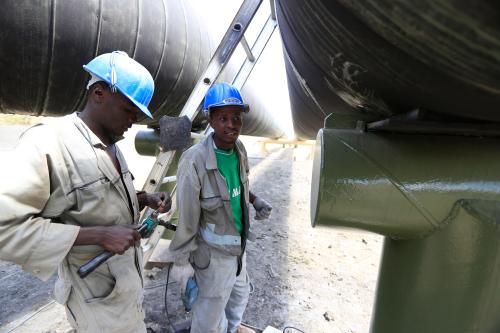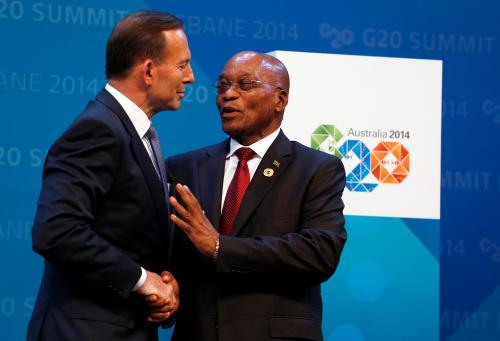Brookings Global Economy and Development experts offer their expertise on a wide variety of issues pertinent to African economic and social development. In addition to blogs and other web-based commentary, our scholars also publish extensively in academic journals and through various working paper series. The following summaries link to some of our recent outputs focused on African industry, agriculture and financial flows, among others.
Africa Growth Initiative Senior Fellow Amadou Sy has recently published work investigating financial constraints and opportunities across sub-Saharan Africa.
- The number of African countries considering accessing international bond markets is increasing. In their contribution to the Journal of African Economies, Volume 23, “Beyond Aid: How Much Should African Countries Pay to Borrow?” Amadou and his colleague Cheikh A. Gueye offer a two-step approach to estimating the sovereign credit rating and interest rate cost of a country considering borrowing externally.
- In his paper for the Fondation pour les Études et Recherches sur le Développement International, Four Instruments to Strengthen Financial Integration in Sub-Saharan Africa, Amadou argues that stronger regional institutions; adherence to “threshold conditions,” including good governance and minimum financial development; equality of access, rules and treatment for foreign institutions entering domestic markets; and improvement of financial infrastructure are key to strengthening financial integration on the continent.
- As part of the Brookings Global Think Tank 20 series, Amadou discusses the convergence—the rapid approach of average incomes in low- and middle-income countries towards those in advanced economies–in the sub-Saharan African context. In his brief, Is Africa at a Historical Crossroads to Convergence?, Amadou explores why sub-Saharan Africa lags behind the rest of the developing world in terms of convergence and offers recommendations for how African policymakers can overcome the obstacles standing in their way
Director of the Development Policy Research Unit at the University of Cape Town and Africa Growth Initiative Nonresident Senior Fellow Haroon Bhorat recently published a high-profile piece on the impact of minimum wage legislation on South Africa’s agricultural sector. Haroon, along with co-authors Ravi Kanbur and Benjamin Stanwix, offer a rare econometric analysis of labor market outcomes in Africa through an assessment of the impact of South Africa’s minimum wage laws on rates of employment and wages within the agricultural sector for the American Journal for Agricultural Economics. The article, “Estimating the Impact of Minimum Wages on Employment, Wages, and Non-wage Benefits: The Case of Agriculture in South Africa” finds “significant employment reduction in agriculture from the minimum wage (and particularly a noticeable move away from employment of part-time workers), an increase in wages on average, and a rise in non-wage benefits compliance.”
Global Economy and Development Senior Fellow John Page has published the latest case studies in Learning to Compete, a collaborative research effort by the African Development Bank, the Brookings Institution and the United Nations University-World Institute for Development Economics Research looking at the obstacles to industrialization in Africa. By comparing eight sub-Saharan African countries (Ethiopia, Ghana, Kenya, Mozambique, Nigeria, Senegal, Tanzania and Uganda) with one from North Africa and two from newly industrializing East Asia, John and his colleagues investigate range of public policies used to promote industrial development and the evolution of industry in each country— finding that sub-Saharan African countries, despite their diversity, oddly converge in their failure to industrialize.
Global Economy and Development Senior Fellow John McArthur has recently published two pieces on topics vitally important to the continent—agriculture and child mortality.
- For the region’s poor, 70 percent of whom live in rural areas, agriculture is the dominant economic activity. Low-income countries in sub-Saharan Africa derive, on average, 30 percent of their GDP from agriculture. Thus, the debate around the role of agriculture in structural transformation—the long-term societal process whereby labor moves from low productivity rural food production to higher productivity urban sectors like manufacturing and services—is particularly important to sub-Saharan Africa. In their Brookings Global working paper, Fertilizing Growth: Agricultural Inputs and Their Effects in Economic Development, John and his colleague Gordon McCord examine how agricultural inputs as drivers of higher yields might lead to subsequent economic transformation.
- In his Brookings Global working paper, Seven Million Lives Saved: Under-5 Mortality Since the Launch of the Millennium Development Goals, John investigates what role the Millennium Development Goals have played in reducing the under-5 mortality rate (Goal 4). He finds that, though many countries will likely not achieve their targets, their progress towards the goal has been unprecedented. Over 7.5 million lives have been saved—and the majority of those lives have been in sub-Saharan Africa.






Commentary
In Case You Missed It: Brookings Scholars Cover African Industry, and Social and Economic Development
December 5, 2014